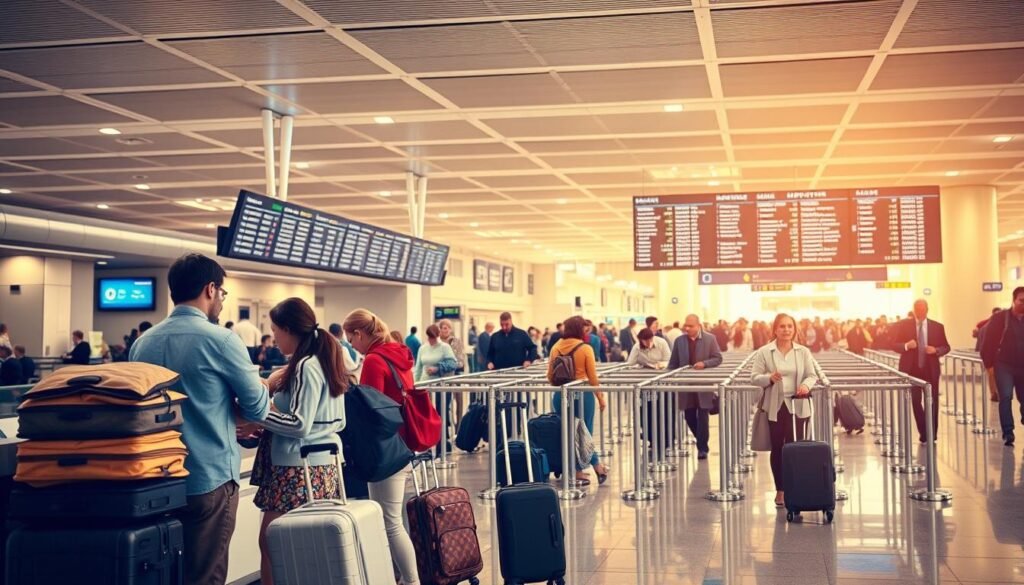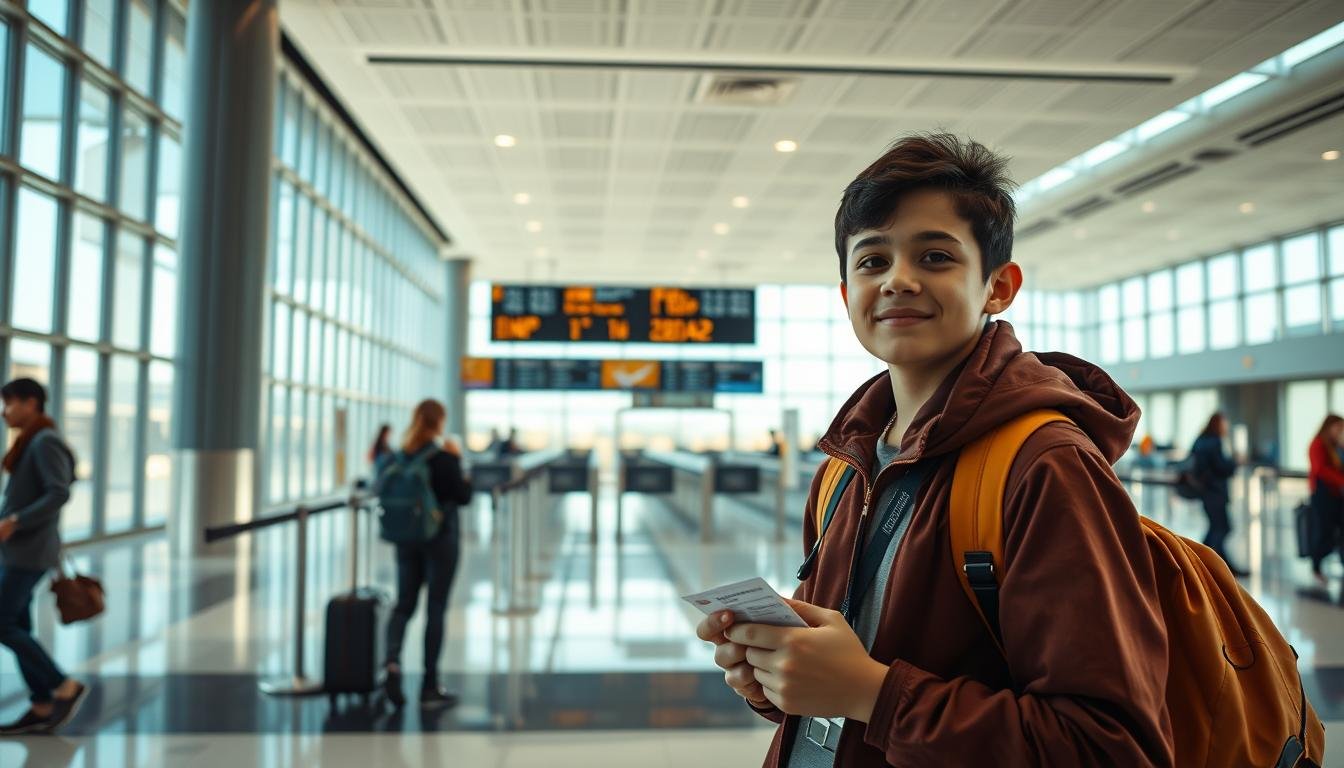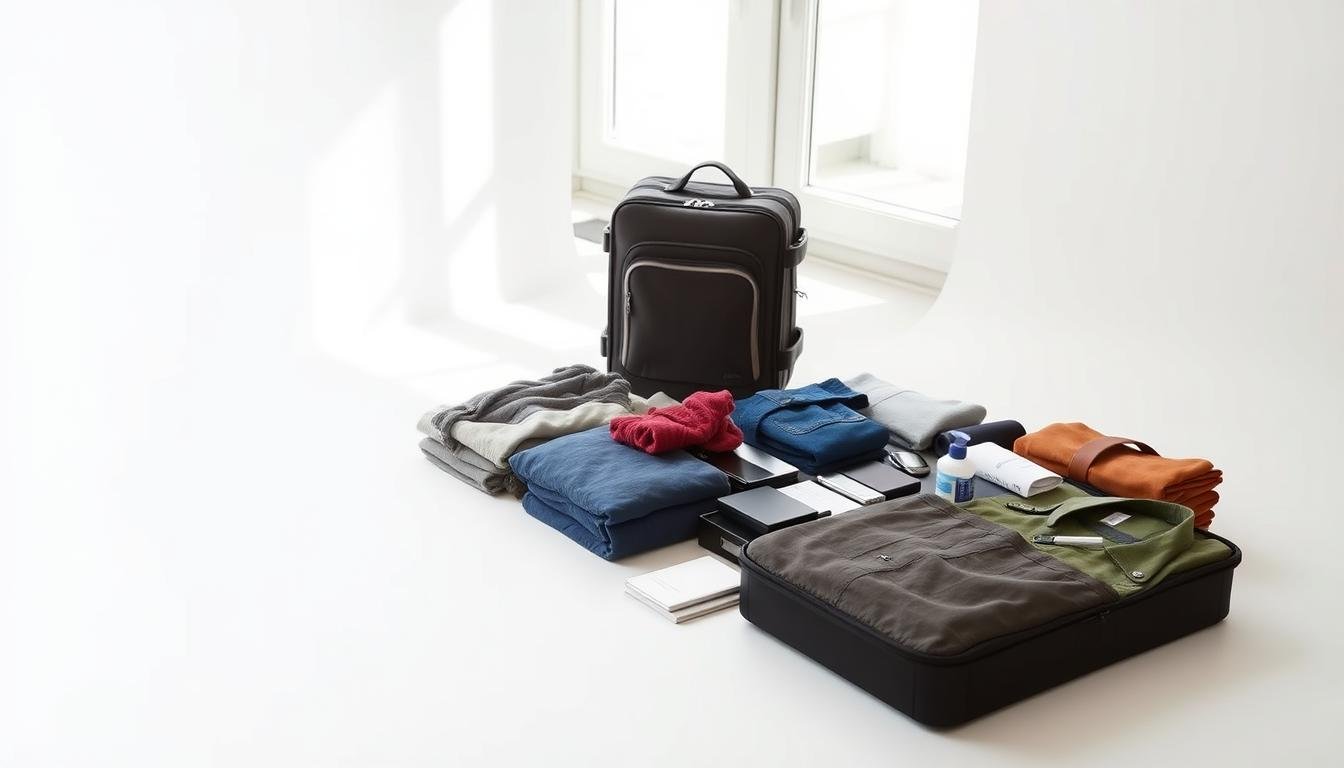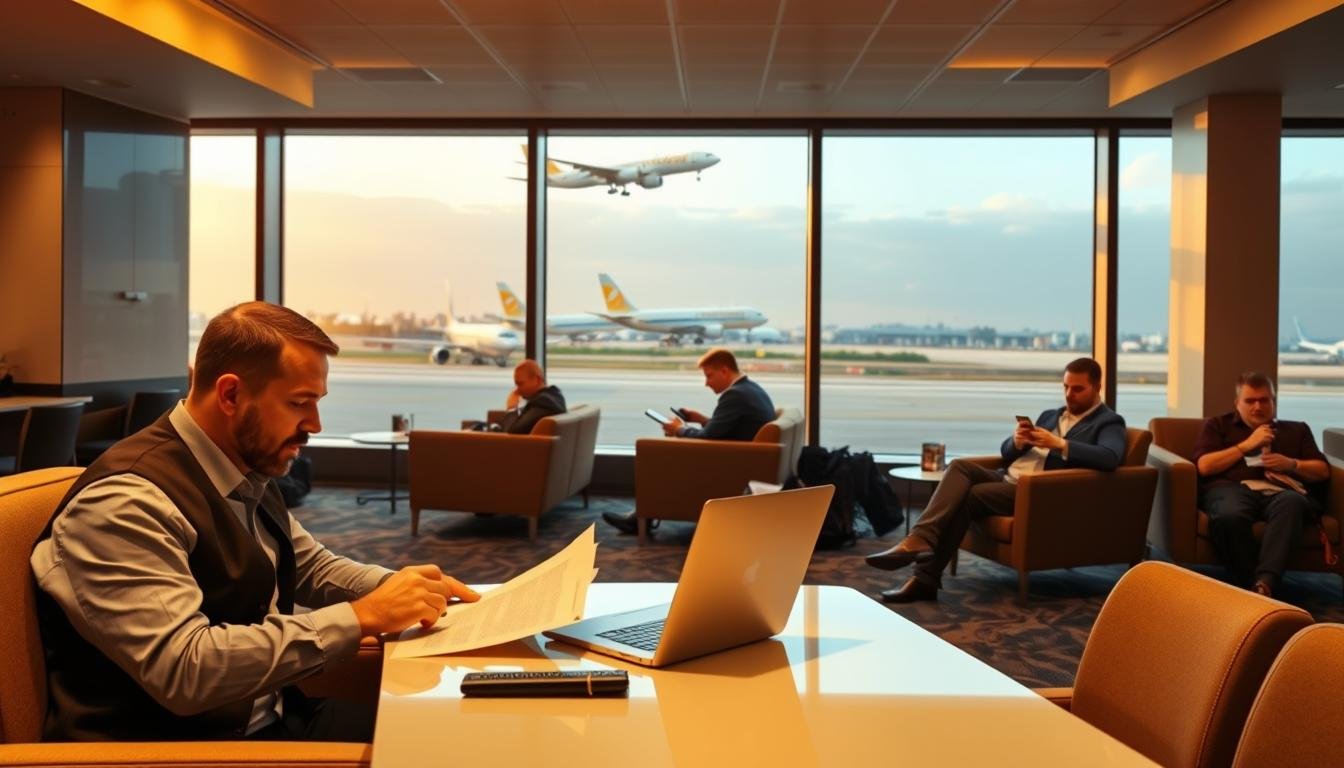Are you ready to take to the skies for the first time and wondering what to expect?
Flying can be a daunting experience, but it doesn’t have to be. With the right guidance, you can navigate this journey with ease.
As a first-time flyer, you might feel a mix of excitement and nerves. This article will give you essential insights to make your flying experience smooth and enjoyable.
Key Takeaways
- Understand the flying process to reduce anxiety
- Learn how to prepare for your first flight
- Discover essential tips for a smooth journey
- Get familiar with airport procedures
- Know what to expect during the flight
Understanding the Basics of Air Travel
Starting your first flight can feel scary, but knowing the basics makes it easier. Learning about air travel helps you enjoy your journey more.
How Commercial Flights Work
Commercial flights use a system with airlines, airports, and air traffic control. They ensure safe travel for passengers and cargo.
First, airlines plan the flight route, considering weather and air traffic. Then, they prepare the plane for takeoff, doing safety checks and fueling.

Common Aviation Terminology
Aviation has its own language. Knowing common terms improves your flying experience. Terms like “gate,” “baggage claim,” and “boarding” are key.
- Gate: The area where you board the aircraft.
- Baggage Claim: The area where you collect your checked luggage after the flight.
- Boarding: The process of entering the aircraft.
- ETA: Estimated Time of Arrival.
- ETD: Estimated Time of Departure.
Types of Airlines and Flight Classes
Airlines offer different services. Knowing the differences helps you pick the right one. There are full-service, low-cost, and regional carriers.
| Airline Type | Characteristics | Examples |
|---|---|---|
| Full-Service Airlines | Offer a wide range of services, including meals, checked baggage, and in-flight entertainment. | American Airlines, Delta Air Lines |
| Low-Cost Carriers | Provide basic services at a lower cost, with additional fees for extras like checked baggage and meals. | Spirit Airlines, Frontier Airlines |
| Regional Airlines | Operate shorter flights, often connecting smaller cities to major hubs. | Envoy Air, SkyWest Airlines |
Flight classes range from Economy to First Class. Knowing these options helps you choose the right comfort and service level.
Planning Your First Flight: Booking Strategies
Booking your first flight right is key to a smooth journey. Knowing how to book can greatly improve your travel experience.

Finding the Best Flight Deals
To get the best deals, be flexible with your travel dates. Look for off-peak seasons. Use flight comparison sites to find cheap options.
Also, sign up for airline newsletters and follow them on social media. This way, you’ll get updates on sales and promotions.
For more tips on avoiding flying mistakes, check out Travel & Leisure’s guide.
Choosing the Right Seats
Choosing the right seat is important for comfort. Most airlines let you pick seats during booking or check-in. For a smoother ride, pick seats near the front or over the wing.
Understanding Airline Fees and Policies
Airline fees and policies can be tricky for beginners. Know what your ticket covers and what might cost extra. This includes baggage, meals, or seat choices. Always check the airline’s policies before booking to avoid surprises.
Essential Travel Apps for First-Time Flyers
There are many travel apps to help you. Skyscanner and Google Flights are good for comparing prices. TripIt helps organize your trip. These apps can make flying easier and less stressful for first-timers.
Essential Travel Tips for First-Time Flyers: Pre-Flight Preparation
Before you fly, knowing the basics of pre-flight prep is key. As a first-timer, having a detailed guide can ease your worries. It lets you start enjoying your trip right away.
Documentation Requirements
Getting your documents in order is a must. You’ll need a valid passport, ID, and any visas for your trip. Make digital copies and save them online or with someone you trust.
Visa requirements change by country, so check early. Your passport must also be valid for a bit after you leave.
Packing Efficiently for Air Travel
Packing smart is an art that makes travel better. First, check the weather forecast for your destination. Then, see what your airline allows in terms of luggage size, weight, and items you can’t bring.
Pack clothes that can be mixed and matched. Include chargers, meds, and travel papers. Keep important items in your carry-on.
Pre-Flight Health Considerations
Your health is most important when traveling. Make sure you’re up to date on vaccinations for your destination. Talk to your doctor if you have health issues.
Drink water and eat light before flying. Some people wear compression socks to prevent blood clots on long flights.
Setting Up Travel Notifications
Airlines and travel services offer updates on flights and gates. Set up these notifications to stay informed and adjust plans as needed.
Tell your bank and credit card about your travel plans. This prevents them from thinking your transactions are suspicious while you’re away.
Navigating the Airport Experience
The airport can feel overwhelming, but knowing what to expect helps. As you prepare for your first flight, learning about airport steps reduces anxiety. It makes your journey smoother.
Airport Arrival Timing
Arriving early is key. For domestic flights, get there 2 hours before your flight. For international flights, aim for 3 hours early. This gives you time for check-in, baggage drop-off, security, and reaching your gate without stress.
Check-in Procedures
Check-in has gotten easier with technology. You can check in online 24 hours before your flight. This lets you pick your seat and print or download your boarding pass. If you need to check in the old way, self-service kiosks and counters are there. Learning about airport check-in saves time and reduces stress.
Security Screening Tips
Security screening is a big part of the airport process. To make it smoother, wear easy-to-remove shoes and avoid metal items. Have your boarding pass and ID ready. Knowing the TSA’s rules on banned items helps avoid surprises.
Finding Your Gate
After security, finding your gate is next. Airport signs help guide you. Look at the departure boards for gate info, times, and any changes. In big airports, gates can be far apart, so plan your time well to catch your flight.
Understanding these airport steps helps you handle the process better. It makes your first flight more enjoyable and less stressful.
Boarding Process and Airplane Etiquette
The boarding process is key in air travel. Knowing how to navigate it with good etiquette can make a big difference for first-time flyers. As you step onto the plane, you join a community of travelers. Being mindful of your actions and how they impact others can make your flight better.
Understanding Boarding Groups
Airlines use a boarding group system to manage passengers. Pay attention to your boarding group and be ready to board when it’s called. Groups are based on fare class, loyalty program status, or check-in time. Knowing this can help you avoid stress and make boarding smoother.
Stowing Your Luggage
When storing your carry-on luggage, efficiency and courtesy are key. Stow your bags in the overhead bins or under the seat in front of you. Make sure to do so in a way that maximizes space for everyone. Avoid blocking aisles or taking up too much space with your belongings.
If you’re having trouble fitting your bag into the overhead bin, consider checking it. Or ask for assistance from the flight attendants.
Respecting Fellow Passengers
Respecting your fellow passengers is key for a pleasant flight. Be mindful of your surroundings and keep your voice down when talking on the phone or to your seatmates. Avoid strong perfumes or colognes that might disturb others.
Also, be considerate when reclining your seat. A simple courtesy is to glance back and check if the person behind you is working on a laptop or occupied.
Communication with Flight Attendants
Flight attendants are there to ensure your safety and comfort. If you have any needs or concerns during the flight, don’t hesitate to communicate with them. Whether you need assistance with stowing your luggage, have a special meal request, or are feeling unwell, they are trained to help.
Being polite and respectful in your interactions can go a long way in getting the assistance you need.
In-Flight Comfort and Wellness
Comfort in the air is more than just feeling good. It’s also about managing fear and anxiety. Knowing how to make your flight better can really help.
Managing Anxiety and Fear of Flying
Flying can make many people anxious. Breathing exercises and meditation can calm you down. Try apps that guide you in relaxation.
- Practice deep breathing exercises to calm your mind.
- Use meditation apps like Calm or Headspace.
- Familiarize yourself with the flight process to reduce unknowns.
Staying Comfortable During Long Flights
Long flights can be tough, but there are ways to stay comfy. Choosing the right seat is key. Look for seats with more legroom or consider upgrading.
- Select a seat with adequate legroom.
- Stay hydrated by drinking plenty of water.
- Move around the cabin periodically to prevent stiffness.
Dealing with Ear Pressure and Motion Sickness
Ear pressure and motion sickness are common in flight. Chewing gum and yawning can help with ear pressure. They open the Eustachian tube.
“Flying can be uncomfortable, but there are ways to feel better. Taking steps like using medication or acupressure bands can help.”
- Use over-the-counter medication for motion sickness.
- Try acupressure bands designed for motion sickness relief.
- Keep your seatbelt fastened to minimize the impact of turbulence.
By using these tips, first-time flyers can make their flight more comfortable. This makes flying a better experience.
Understanding In-Flight Services and Amenities
In-flight services and amenities make flying more comfortable and fun. Knowing what’s available on board is key for a smooth trip.
Food and Beverage Options
Airlines offer many food and drink choices. These range from snacks to full meals, depending on the airline and flight length. Longer flights or higher classes often have more options.
Some airlines have special meals like vegetarian or gluten-free. It’s wise to ask for these in advance. This way, you can ensure they’re available.
Entertainment Systems
In-flight entertainment has improved a lot. You can watch movies, TV shows, listen to music, and play games. Many airlines have screens on seats or apps for streaming.
The entertainment choices vary by airline. Some offer hundreds of options. Live TV is also available on some flights, adding to the fun.
Wi-Fi and Connectivity
Many airlines now offer Wi-Fi. The quality and cost vary. Some offer it for free, while others charge.
It’s important to check the airline’s Wi-Fi policy before flying. This way, you know what’s available and what it costs. Some airlines also have messaging services for staying in touch without Wi-Fi.
Special Assistance Services
Airlines help passengers with disabilities or special needs. This includes wheelchair help, special meals, and extra support during the flight.
Telling the airline about your needs in advance is vital. Contact their customer service to arrange for these services.
Handling Unexpected Situations
Even with the best planning, unexpected situations can arise during air travel. Knowing how to handle them can reduce stress. As a first-time flyer, it’s essential to be prepared for disruptions that may impact your journey.
Flight Delays and Cancellations
Flight delays and cancellations are common disruptions. If your flight is delayed or canceled, stay calm. Check with your airline for rebooking options or refunds.
Tips for Handling Delays and Cancellations:
- Check the airline’s app or website for updates.
- Know your rights regarding compensation.
- Consider rebooking on the next available flight.
Lost or Delayed Baggage
Lost or delayed baggage can be a big inconvenience. To minimize the impact, tag your luggage clearly. Keep essential items in your carry-on. If your baggage is lost or delayed, report it to the airline immediately.
What to Do:
- File a report with the airline’s baggage service office.
- Keep your baggage claim tag handy.
- Stay in touch with the airline for updates on your baggage’s status.
Missed Connections
Missing a connection can be stressful, with tight travel schedules. If you miss your connection due to a delay, the airline typically assists with rebooking. Make sure you understand the airline’s policy on missed connections.
Passenger Rights You Should Know
As a passenger, you have certain rights that protect you in cases of flight disruptions. Familiarize yourself with these rights to ensure you’re treated fairly. This includes understanding compensation for delays, cancellations, and assistance during long delays.
Key Passenger Rights:
- Right to compensation for certain disruptions.
- Assistance during long delays, such as food and accommodation.
- Rebooking on the next available flight in case of cancellations.
Conclusion: Embracing the Joy of Air Travel
As you get ready for your first flight, remember that knowing what to do is key. By following these tips, you’ll have a smooth journey.
A guide for first-time flyers is more than just getting from one place to another. It’s about enjoying the thrill of new places. With the right attitude and preparation, you can make your first flight an adventure.
Learning beginner air travel tips, like understanding airline rules and staying comfy, helps a lot. Remember, being positive and prepared is as important as having your documents and knowing what’s next.
Now, you’re ready to start your flying adventure with confidence. Enjoy the ride and happy travels!











